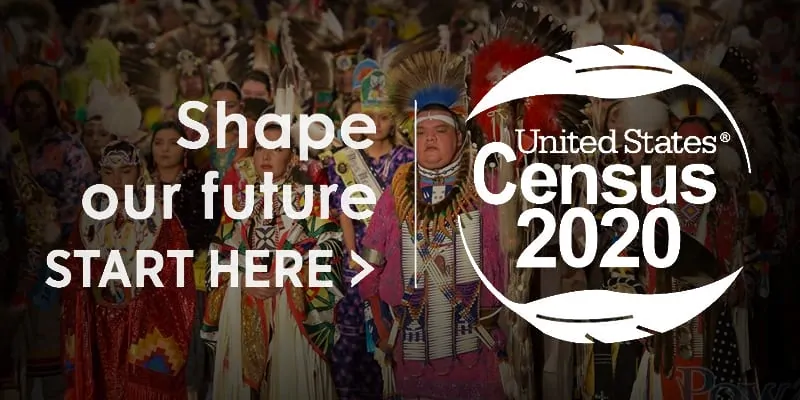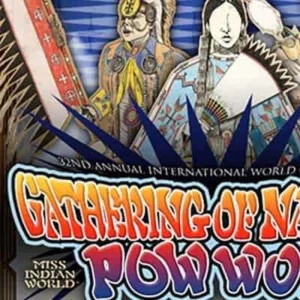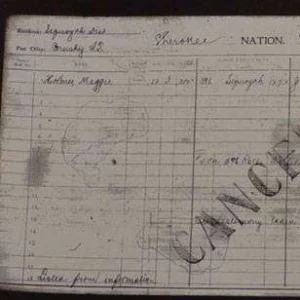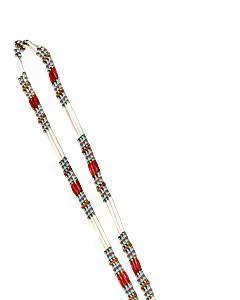Many Native People Weren’t Counted in the Last Census
The US Census occurs once every ten years. Since the first census in 1790 (229 years ago!) there have been 22 official censuses. This year, in January of 2020, the latest census will officially launch.
There are a few purposes to the census:
- To apportion seats in Congress
- To define legislative and school districts
- To make decisions about community infrastructure and services (schools, roads, job training, services for the elderly, disabled, veterans, and more)
- To distribute over $675 billion in federal fund toward public health, education, transportation, neighborhood improvements and more
To get accurate census data, it’s important to count everyone. Unfortunately, experts believe that Native Americans and Alaska Natives have been undercounted in nearly every census, both on-reservation and off.
CPN Workforce Development and Social Services director Margaret Zientek says, “When you have Tribal rolls, it says we have 34-35,000 people, but census says you have 1,400; you know there’s an error.”
Even the most recent census had serious undercounting issues. The US Census Bureau itself has evaluated its census coverage and estimated that nearly 5% of Native people went uncounted in 2010, which was the highest uncounted percentage of any group.
Why This Is a Problem: Lack of Money and Representation
The purpose of the census is to know how many people live in each area of the US. With this knowledge, the government can fairly distribute federal funds throughout communities all over the country. Federal funds like these are used to build roads, public schools, hospitals, and more. In addition, the census determines whether states will gain or lose seats in Congress, so it’s a key foundation of how our government works.
So when any population is underrepresented, their communities may experience hardships due to lack of funding for their roads, schools, hospitals, and other important services. They’re also more likely to be politically underrepresented in Washington. Since Native people are already underrepresented in so many areas, this is a major problem in our country.
The Government is Responsible for Supporting Us, and We Need to Let Them
The federal government is responsible for supporting Native American tribes with services and funding. But if they undercount the number of Native Americans, then there will be less support for us. Specifically, here are some of the services that the census helps to fund:
- Workforce Innovation and Opportunity Act services for the unemployed
- Department of Labor workforce funds
- Housing and Urban Development resources for Indigenous people
- Multiple nonprofits and organizations
Your tribal community will be funded properly if—and only if – you have the census numbers to prove how many Native American people are in your jurisdictional area. So, be sure to select “American Indian” as your race on the census form and write in your tribal affiliation if possible.
Remote and Rural Households and a Longstanding Distrust of the Government
There are a few reasons why Native populations have been historically undercounted. The first reason is simple geography. Cities are easy to count: there’s more coverage of phone service and Internet access, and everyone has an easily-accessible mailbox. But the remote Southwestern deserts and the Alaskan bush are much more difficult to reach. These remote locations require local census takers who know the area well.
The second reason is more complex. Many American Indian people don’t trust the federal government. They don’t want anything to do with the census because they don’t believe that the government has their best interest in mind. Many people also don’t understand that the census is designed to help communities, not hurt them. So even if they do receive their census questionnaire, many people have historically decided not to respond.
What the Census is Doing to Make Sure We Get Counted
Hopefully, the 2020 census will be able to overcome both of these challenges so that each of our nations can get the funding and representation that they need.
To make sure everyone is counted, the Census Bureau has been working to get tribal governments involved. Tribal governments are generally connected with people both on-reservation and off-reservation, and they can be a great help to the census efforts.
More than 100 tribes and tribal associations have appointed an official 2020 Census Tribal Liaison, a person who works with the community and regional tribal partnership staff to help raise awareness and build trust.
In Alaska, the census efforts are starting early with the Remote Alaska Operation. Alaska Natives recommended the early start because once the spring thaw occurs, many residents will be out hunting and fishing and may not be at home for weeks at a time. Local census-takers are already out in the remote villages, traveling by bush planes, snowmobiles and even dogsleds.
You can learn more about the Census Bureau’s partnership efforts by reading this article from Dr. Ron Jarmin, a Census Bureau director who has spent the last few years working closely with local tribal leaders across the US.
In addition to working with tribal governments, the Census Bureau is ramping up its efforts to ensure everyone feels safe answering the census. Some people are worried about scammers misrepresenting themselves as census employees, and they don’t want to answer the questions for this reason. To combat this problem, the Census Bureau offers several ways to help people double-check whether their census phone call or in-person visit is legitimate.
How to Respond to the Census
In most cases, the US Census Bureau will mail you a questionnaire form. You can respond to the 2020 census in three ways: online, by phone, or by mail.
Note: if you live in a very remote area or in a group home, such as a nursing home, then you will probably get an in-person visit instead of a mailed questionnaire.
Online: If you have Internet access, it’s recommended to fill it out online. You’ll find the instructions included in the letter you receive. You will need information from the mailed letter in order to answer online. The Census Bureau assures us that it is safe, secure, confidential, and user-friendly to respond online.
By Phone: When you receive your census questionnaire, call toll-free 1-800-354-7271.
By Mail: If you can’t answer the census questionnaire online or you prefer not to, you can mail back the questionnaire that you got in the mail. There will be a postage-paid envelope included.
Didn’t Get a Letter? If you do not get a letter, you can still answer online, by phone, or by mail. In general, if the Census Bureau doesn’t hear from your household, you should get an in-person visit. This is the standard for people living in remote areas or in group homes.
In most cases, you should receive your census form in the mail sometime around mid-March, with April 1st as the official “Census Day.”
Here's the takeaway:
- Complete the census questionnaire either online, by phone, by mail or in person
- Select “American Indian” as your race on the census form
- Write in your tribal affiliation if possible.
Be on the lookout for an official census questionnaire in the mail, and be sure to respond accurately: your community depends on it! When more Native people answer the census this year, they will be helping to generate new services for their Native communities.
Additional 2020 Census Information
-
Information for American Indians and Alaska Natives on the Race Question
-
2020 Census Snapshot for American Indians and Alaska Natives
-
Handout for Urban American Indians and Alaska Natives
Census 2020 sponsored this article on PowWows.com
Last Updated on April 14, 2021 by Paul G




Rosemarie Dimonte
says:Hi Paul & All My Native Brethren & Sister’s I wasn’t born Native Indian, Yet my heart,soul,mind certainly is🤗 my entire life on planet earth has always LOVE INDIAN PEOPLE’S So much so when my family would watch cowboys & Indians I would deeply feel how the Peace Loveing Inocent & Pure Indians were being treated by white man & I hated that As I still do now!!!I I always wanted My Indians to win the battles & not to die, but the white man to die👍Since the beginning of time with the pilgrim’s whom y’all trusted the Demonic government DECIEVED STOLE, RANSACKED TORTURED, MURDERED THE MOST FREE SPIRITED KINDEST LOVEING SELFLESS PEOPLE’S ON THIS SIN SICKENING PLANET!!! I’M ANGRY FOR SURE THEY’VE DONE IT TO JESUS CHRIST ALSO!!! I’M TRULY APPALLED & SAD FOR HOW EVIL OVER POWERS GOOD😭 I LOVE U MY NATIVE PEOPLES P.S. U R NOT NATIVE AMERICANS BUT NATIVE INDIANS IN MY HEART 4-EVER🌹
Rosemarie Dimonte
says:Hi Paul & All My Native Brethren & Sister’s I wasn’t born Native Indian, Yet my heart,soul,mind certainly is🤗 my entire life on planet earth has always LOVE INDIAN PEOPLE’S So much so when my family would watch cowboys & Indians I would deeply feel how the Peace Loveing Inocent & Pure Indians were being treated by white man & I hated that As I still do now!!!I I always wanted My Indians to win the battles & not to die, but the white man to die👍Since the beginning of time
Cynthia Jewell
says:I am trying to find out how to find out more info about my Father ! He was adopted when he was 3 weeks old , he was 1/2 Cherokee and 1/2 Apache from the Dakota Tribe ! He was born 1904 in Cincinnati Ohio and was put in and Orphan home and stay there until he was age 17 and was adopted by american family and then had to take there last name and his birth name was drop but my Brother had talk to my dad and learn more about my father childhood past and he was able to get his last name it was Sequoya, I have found out that my father last name was by Dakota tribal name , I am seeking on how to find out how to get my father tribal Rights back to him even though he has past away on my day of birth! I feel so defeated as I try my hardest to pull up anything I can and get turn away !! I am all am dyeing as I have stage 4 Kidney cancer and congenital heart failure but my heart and soul an spirit say get this done for your own peace of mind and I am at lost for words an where to go get help to do this last act of my life for my father rights an mind ! I know I am a Cherokee an Apache Indian and I know I belong to Dakota Tribal but just can’t get the right info to become a register Native Tribal Cherokee an Apache Indian!! This is so frustrated that I know all this info about my father but NO one in the Tribal Nation will help me get this done for me!! I am just venting a lot loud as I feel so defeated as I can not complete my last wish’s for my Father Rights and mind as well!! Thank you for listing to me pouring my heart out to the public!!
Barbara Neu
says:Try doing an Ancestry DNA test. My sister and I found our adopted sister’s family that way.
Alfredo Lopez
says:It would be a good thing if the census takers were aware of the native INDIGENOUS regional history.
NOREEN SCHAAN
says:I am a Canadian Indigenous woman. I am of Cree and Salteaux decent and I am very happy with this census that is happening in the United States. I am very proud of my family heritage and I have been teaching my children and grandchildren their heritage as well. This is a good thing for my fellow brothers and sisters who need to be counted. All the Best fro. HOPE, BC CANADA 🇨🇦🙂👍🙌✊💖
Pauline Rita Solis Chavez
says:I am not a Native American , however in my community I am very proud and have many friends in the Native community. I am always speaking out on how Native’s are left out of almost everything. So my question is , do I have to be Native to apply for this job.
Paul G
says:No, I don’t believe so.